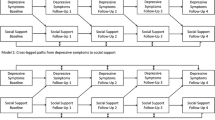Abstract
This study examined the association of social support (SS) and affective disturbance among low-income primary care patients with no chronic illnesses vs. those with type 2 diabetes vs. those with other chronic illnesses. The sample was predominantly middle aged (47.2 years old), African American (74%) and female (80%), with an average individual monthly income of approximately $500. Participants (N = 326) were administered the Diagnostic Interview Schedule, IV and the Interpersonal Support Evaluation List. Logistic regression results indicated that each standard deviation decrease in SS, increased the odds of having a depressive or anxiety disorder diagnosis by .618 OR (CI .472, .808, p < .000) for all study participants; .438 OR (95% CI .195, .987, p = .046) for those with hypertension, asthma and/or arthritis; and .326 OR (95% CI .141, .755, p = .009) for those with type 2 diabetes. Results suggest that SS may serve an important role in the association between stress and depression/anxiety diagnoses among low-income, primary care patients.
Similar content being viewed by others
References
Albright, T. L., Parchman, M., & Burge, S. K. (2001). RRNeST investigators: Predictors of self-care behavior adults with type 2 diabetes: An RRNeST study. Family Medicine, 33, 354–360.
American Psychiatric Association. (1994). Diagnostic and statistical manual of mental disorders, (4th ed.). Washington, DC: Author.
Anderson, R. J., Freedland, K. E., Clouse, R. E., & Lustman, P. J. (2001). The prevalence of comorbid depression in adults with diabetes: A meta-analysis. Diabetes Care, 24, 1069–1078.
Anderson-Loftin, W., & Moneyham, L. (2000). Long-term disease management needs of southern African Americans with diabetes. The Diabetes Educator, 26, 821–832.
Bradshaw, B. (2002). The role of the family in managing therapy in minority children with type 2 diabetes mellitus. Journal of Pediatric Endocrinology and Metabolism, 15(Suppl 1), 547–551.
Brantley, P. J., Scarinci, I. C., Carmack, C. L., Boudreaux, E., Streiffer, R. H., & Givler, D. N. (1999). Prevalence of high-risk behaviors and obesity among low-income patients attending primary care clinics in Louisiana. Journal of the Louisiana Medical Society, 151, 126–135.
Broadhead, W. E., Kaplan, B. H., & James, S. A. (1983). The epidemiologic evidence for a relationship between social support and health. American Journal of Epidemiology, 117, 521–537.
Brown, G. W., Andrews, B., Harris, T., Adler, Z., & Bridge, L. (1986). Social support, self-esteem and depression. Psychological Medicine, 16, 813–831.
Center for Disease Control (CDC). (2005). Social support and health-related quality of life among older adults, Missouri, 2000. Morbidity and Mortality Weekly Report, 54, 433–437.
Clark, V. R. (2001). The perilous effects of racism on blacks. Ethnicity and Disease, 11, 769–772.
Cobb, S. (1976). Social support as a moderator of life stress. Psychosomatic Medicine, 3, 300–314.
Cohen, S., Mermelstein, R., Kamarch, T., & Hoverman, H. (1985). Measuring the functional components of social support. In I. Sarason & B. Sarason (Eds.), Social support: Theory, research, and applications. Dordrecht: Martinus Nijhoff.
Cohen, S., & Syme, S. L. (1985). Social support and health. Orlando: Academic Press.
Cohen, S., & Wills, T. A. (1985). Stress, social support and the buffering hypothesis. Psychological Bulletin, 98, 310–357.
Cohen, S. (1988). Psychosocial models of the role of social support in the etiology of physical disease. Health Psychology, 7, 269–297.
Connell, C. M., Davis, W. K., Gallant, M. P., & Sharp, P. S. (1994). Impact of social support, social cognitive variables, and perceived threat on depression among adults with diabetes. Health Psychology, 13, 262–273.
Gallant, M. P. (2003). The influence of social support on chronic illness self-management: A review and directions for research. Health Education Behavior, 30, 170–195.
Gazmararian, J. A., James, S. A., & Lepkowski, J. M. (1995). Depression in black and white women: The role of marriage and socioeconomic status. Annals of Epidemiology, 5, 455–463.
Grigsby, A. B., Anderson, R. J., Freedland, K. E., Clouse, R. E., & Lustman, P. J. (2002). Prevalence of anxiety in adults with diabetes: A systematic review. Journal of Psychosomatic Research, 53, 1053–1060.
Holahan, C. K., & Holahan, C. J. (1987). Self-efficacy, social support, and depression in aging: A longitudinal analysis. Journal of Gerontology, 42, 65–68.
Hough, E. S., Brumitt, G. A., & Templin, T. N. (1999). Social support, demands of illness, and depression in chronically ill urban women. Health Care Women International, 20, 349–362.
Ilias, I., Hatzimichelakis, E., Souvatzoglou, A., Anagnostopoulou, T., & Tselebis, A. (2003). Perception of family support is correlated with glycemic control in Greeks with diabetes. Psychological Reports, 88, 929–930.
Jackson, J. S., Brown, T. N., Williams, D. R., Torres, M., Sellers, S. L., & Brown, K. (1996). Racism and the physical and mental health status of African Americans: A thirteen year national panel study. Ethnicity and Disease, 6, 132–147.
Jackson-Triche, M. E., Greer Sullivan, J., Wells, K. B., Rogers, W., Camp, P., & Mazel, R. (2000). Depression and health-related quality of life in ethnic minorities seeking care in general medical settings. Journal of Affective Disorders, 58, 89–97.
Kahn, R. S., Wise, P. H., Kennedy, B. P., & Kawachi, I. (2000). State income inequality, household income, and maternal mental and physical health: Cross-sectional national survey. British Medical Journal, 321, 1311–1315.
Kessler, R. C., & McLeod, J. D. (1985). Social support and mental health in community samples. In S. Cohen & S. L. Syme (Eds.), Social support and health (pp. 219–238). Orlando: Academic Press, Inc.
Lloyd, C. E., Wing, R. R., Orchard, T. J., & Becker, D. J. (1993). Psychosocial correlates of glycemic control: The Pittsburgh Epidemiology of Diabetes Complications (EDC) study. Diabetes Research and Clinical Practice, 21, 187–195.
Lustman, P. J., Clouse, R. E., Griffith, L. S., Carney, R. M., & Freedland, K. E. (1997). Screening for depression in diabetes using the Beck Depression Inventory. Psychosomatic Medicine, 59, 24–31.
Lustman, P. J. (1988). Anxiety disorders in adults with diabetes. The Psychiatric Clinics of North America, 11, 419–432.
McDonald, P. E., Wykle, M. L., Misra, R., Suwonnaroop, N., & Burant, C. J. (2002). Predictors of social support, acceptance, health-promoting behaviors, and glycemic control in African–Americans with type 2 diabetes. Journal of the National Black Nurses Association, 13, 23–30.
Nagasawa, M., Smith, M. C., Barnes, J. H., Jr., & Fincham, J. E. (1990). Meta-analysis of correlates of diabetes patients’ compliance with prescribed medications. The Diabetes Educator, 16, 192–200.
Okwumabua, J. O., Baker, F. M., Wong, S. P., & Pilgram, B. O. (1997). Characteristics of depressive symptoms in elderly urban and rural African Americans. Journal of Gerontology, 52A, M241–M246.
Olfson, M., Shea, S., Feder, A., Fuentes, M., Namura, Y., & Weissman, M. M. (2000). Prevalence of anxiety, depression and substance disorders in an urban general medicine practice. Archives of Family Medicine, 9, 876–883.
Ornish, D. (1988). Love and survival: The scientific basis for the healing power of intimacy. New York: Harper Collins.
Outlaw, F. H. (1993). Stress and coping: The influence of racism on the cognitive appraisal processing of African Americans. Issues in Mental Health Nursing, 14, 399–409.
Penninx, B. W. J. H., van Tilburg, T., Boeke, J. P., Deeg, D. J. L., Kriegsman, D. M. W., & van Eijk, J. T. M. (1998). Effects of social support and personal coping resources on depressive symptoms: Different for various chronic diseases? Health Psychology, 17, 551–558.
Regier, D. A., Farmer, M. E., Rae, D. S., Myers, J. K., Kramer, M., Robins, L. N., et al. (1993). One-month prevalence of mental disorders in the United States and sociodemographic characteristics: The epidemiologic catchment area study. Acta Psychiatry Scandinavia, 88, 35–47.
Robins, L. N., Cottler, L., Bucholz, K., Compton, W., North, C. S., & Rourke, K. M. (1999). Diagnostic Interview Schedule version IV. St. Louis: Washington University School of Medicine.
Ruggiero, L., Spirito, A., Bond, A., Coustan, D., & McGarvey, S. (1990). Impact of social support and stress on compliance in women with gestational diabetes. Diabetes Care, 13, 441–443.
Simon, G., Ormel, J., VonKorff, M., & Barlow, W. (1995). Health care costs associated with depressive and anxiety disorders in primary care. The American Journal of Psychiatry, 152, 352–357.
Stafford, R. S., Saglam, D., Causino, N., Starfield, B., Culpepper, L., Marder, W. D., & Blumenthal, D. (1999). Trends in adult visits to primary care physicians in the United States. Archives of Family Medicine, 8, 26–32.
Taylor, S. E., & Seeman, T. E. (1999). Psychosocial resources and the SES-health relationship. Annals of the New York Academy of Sciences, 896, 210–225.
Thomas, J. L., Jones, G. N., Scarinci, I. C., & Brantley, P. J. (2002). A descriptive and comparative study of the prevalence of depressive and anxiety disorders in low-income adults with type 2 diabetes and other chronic illnesses. Diabetes Care, 26, 2311–2317.
Uchino, B. N., Cacioppo, J. T., & Kiecolt-Glaser, J. K. (1996). Social support reduces cardiovascular reactivity to psychosocial challenge: A laboratory model. Psychosomatic Medicine, 46, 7–14.
Wallhagen, M. I. (1999). Social support in diabetes. Diabetes Spectrum, 12, 254–260.
Wasserman, L. I., & Trifonova, E. A. (2006). Diabetes mellitus as a model of psychosomatic and somatopsychic interrelationships. The Spanish Journal of Psychology, 9, 75–85.
Weich, S., Churchill, R., Lewis, G., & Mann, A. (1997). Do socioeconomic risk factors predict the incidence and maintenance of psychiatric disorder in primary care? Psychological Medicine, 27, 73–80.
Weinger, K. (2007). Psychosocial issues and self-care. American Journal of Nursing, 107, 34–38.
Willoughby, D. F., Kee, C., & Demi, A. (2000). Women’s psychosocial adjustment to diabetes. Journal of Advanced Nursing, 32, 1422–1430.
Wittchen, H. U., Kessler, R. C., Beesdo, K., Krause, P., Hofler, M., & Hoyer, J. (2002). Generalized anxiety and depression in primary care: Prevalence, recognition and management. Journal of Clinical Psychiatry, 63, 24–34.
Acknowledgment
This work was supported by a grant from the National Institute of Mental Health (R01 MH1194).
Author information
Authors and Affiliations
Corresponding author
Additional information
This paper was awarded the Lifescan Diabetes Research Award at the 23rd Annual Meeting of the Society of Behavioral Medicine.
Rights and permissions
About this article
Cite this article
Thomas, J.L., Jones, G.N., Scarinci, I.C. et al. Social Support and the Association of Type 2 Diabetes and Depressive and Anxiety Disorders Among Low-income Adults Seen in Primary Care Clinics. J Clin Psychol Med Settings 14, 351–359 (2007). https://doi.org/10.1007/s10880-007-9089-0
Published:
Issue Date:
DOI: https://doi.org/10.1007/s10880-007-9089-0




